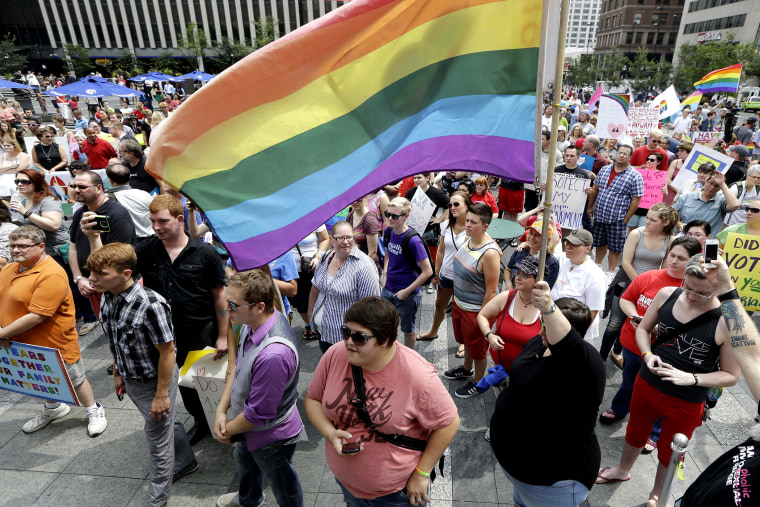Despite their many victories in the courts, same-sex marriage advocates have been anticipating an inevitable loss, and it sounds like the U.S. Court of Appeals for the Sixth Circuit may be the first to oblige. Media coverage of oral arguments describe the two Republican appointed judges on the three judge panel as skeptical of the idea that same-sex marriage bans are unconstitutional.
Judge Jeffrey Sutton, appointed by former president George W. Bush, plainly expressed his view that same-sex marriage rights should be decided at the ballot box.
“I’d have thought the best way to get respect and dignity is through the democratic process,” Sutton said, according to The New York Times. The panel's decision could affect bans in four states: Michigan, Ohio, Tennessee and Kentucky.
Same-sex marriage supporters sustained their first defeat in state court Monday when a state judge in Tennessee upheld that state's ban on recognizing same-sex marriages performed out of state. LGBT rights activists remain undefeated on the federal court level since the Supreme Court struck down part of the Defense of Marriage Act last summer, but even if they lose in the Sixth Circuit, that likely won't be a significant setback for same-sex marriage. In fact, it might even hasten a final showdown.
"Any decision upholding a ban on same-sex marriage is a setback for equality advocates. Yet given the string of recent decisions striking down bans, this setback isn't very significant," said Adam Winkler, a law professor at UCLA. "In fact, an appellate court decision upholding a ban might in some ways help same-sex marriage proponents by creating a circuit split -- and forcing the justices to decide the issue."
When two different federal courts disagree on the constitutionality of a law -- what's called a circuit split -- the Supreme Court is more likely to intervene. Given the significance of the issue however, it's a virtual certainty that the high court will address the matter eventually.
"With so many courts invalidating so many state laws refusing to recognize same-sex marriage, four justices are going to feel like they have to take one of these cases even if no circuit split develops," said Samuel Bagenstos, a law professor at the University of Michigan. "The Court isn't going to allow lower federal courts to be the ones to constitutionalize marriage equality; the justices of the Supreme Court are going to want to be the ones to do that."
It remains to be seen however, if they want to do that. Last year, Justice Anthony Kennedy struck down part of the Defense of Marriage Act with an opinion that seemed torn between his empathy for same-sex couples and his respect for allowing the states to handle their own business. When one of the same-sex marriage cases finally reaches the closely divided court, Kennedy will likely be the deciding vote -- and he will have to make a choice about which matters more. If the Sixth Circuit does hand same-sex marriage opponents their first win in federal court, it's Kennedy who they will be aiming at.
"If Judge Sutton writes a persuasive opinion as to why this should be decided by the people and legislatures rather than the courts, that could be a setback if it is persuasive to Justice Kennedy," said Rick Hasen a law professor at UC-Irvine.
On the other hand, Kennedy has authored every major Supreme Court precedent favorable to LGBT rights in American history. In some sense, it's his life's work. What are the chances that when he has the opportunity, he's not going to want to finish it?
